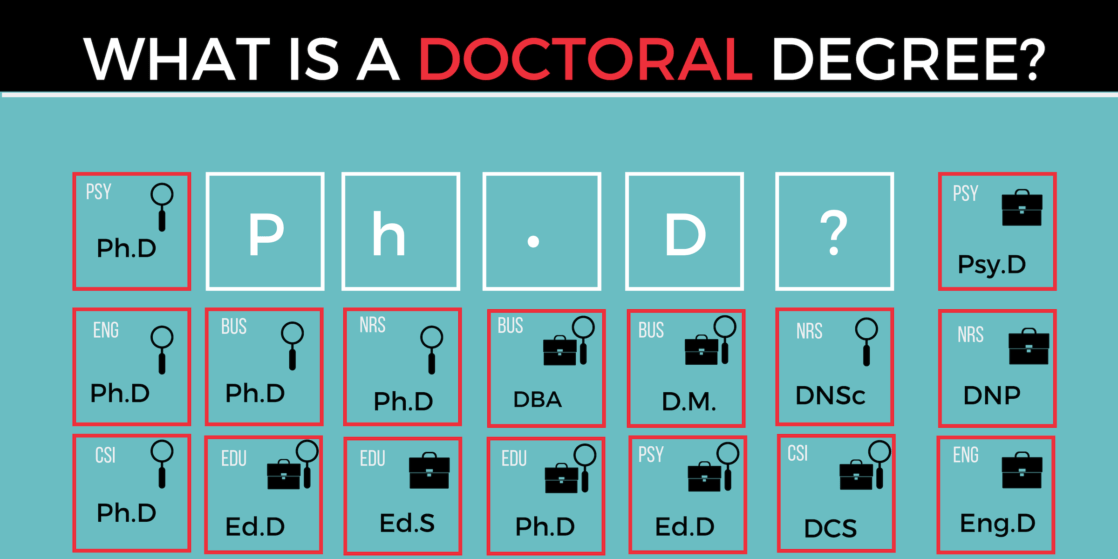Types of Doctorate Degrees

There are many types of doctorate degrees available, so it’s important to know what you’re looking for before deciding. This article will discuss the different types of doctorate degrees and their optimal benefits.
We’ll also give you a list of the most common doctorate degrees and explain them. So read on to learn more about the different types of doctorate degrees and how they can benefit you!
Recommended:
- How Does a PhD Work?
- 7 Top Degrees in Demand for the Future 2022
- 3 Steps to get a scholarship in Canada for International Students
| Qualification | Full Title | Subjects | Type |
|---|---|---|---|
| Ph.D. / DPhil | Doctor of Philosophy | All | Academic |
| DBA | Doctor of Business Administration | Business and Management | Professional |
| EngD / PhD (Eng) | Doctor of Engineering | Engineering | Professional |
| EdD / D.Ed | Doctor of Education | Education | Professional |
| DSocSci | Doctor of Social Science | Social Sciences | Professional |
| DProf | Doctor of Professional Studies | All | Professional |
| DArch | Doctor of Architecture | Architecture | Professional |
| MD | Doctor of Medicine | Medicine and Health Sciences | Professional / Higher |
| Th.D | Doctor of Theology | Theology and Religious Studies | Academic |
| DD / DDiv | Doctor of Divinity | Theology and Religious Studies | Higher / Honorary |
| Dsc / ScD | Doctor of Science | Science, Technology Engineering and Mathematics (STEM) | Higher / Honorary |
| DLitt / LitD | Doctor of Science | Arts and Humanities | Higher / Honorary |
Note: There are many different doctorates available, and they all have their own unique functions, but we’ve mentioned some of the most popular ones here.
Types of Doctorate Degrees
There are many doctorates covered in the table, which are divided into different types; let’s discuss them in detail:
Academic Doctorates
There are a variety of types of academic doctorates, each with its own focus and requirements. These include the basic Ph.D., which is awarded for original research in traditional academic subjects, and more specialized doctoral degrees, such as the MD or DDS.
Academic Doctorates are higher education degrees, typically earned after a student has completed a bachelor’s degree and completed a graduate program in an academic field.
Academic Doctorates may be earned in any area of study, but are most commonly awarded in the arts, humanities, social sciences, and health professions. They are often considered to be the highest level of education attainable after a bachelor’s degree.
Regardless of the type of degree you pursue, an academic doctorate will help you develop a sharper theoretical understanding, broaden your knowledge base, and open many doors to pursuing a career in academia or research.
Professional Doctorates
Professional doctorates awarded for work in a specific vocational field can involve original research and analysis, but also more practical instruction. Candidates may require appropriate experience to qualify.
A professional doctorate is a graduate degree equipping you with the knowledge and skills to practice as a doctor. It can be obtained in various disciplines, such as medicine, dentistry, veterinary medicine, and pharmacy.
Professional doctorates are often sought-after by employers because they signify that you have completed a rigorous academic program and have reached a high level of expertise in your field.
They also offer opportunities for career growth, as you can move up in your profession by completing additional training or pursuing a specialization.
Professional Doctorates are a highly coveted credential, often required for many careers in the medical field. They are also an important part of the higher education system and can give you a major leg up in your career.
Higher Doctorates
Higher doctorates are often awarded to esteemed researchers or practitioners later in their careers to recognize their distinguished work. Students normally do not enroll for these doctorates as traditional university degrees.
Higher Doctorates are doctorate degrees that take longer to complete than a Doctorate of Science or Doctorate of Medicine. They are typically conferred on academic professionals who have achieved distinguished research accomplishments in their field.
Higher Doctorates may also be conferred on other academic professionals, such as teachers, who have distinguished themselves by excellence in their field.
It is one of the highest honors that an individual can achieve in his or her field of study.
Honorary Doctorates
Honorary Doctorates are awarded to individuals who have demonstrated excellence in their academic or professional work. They can be granted at a university’s discretion and do not require any specific track record.
An honorary doctorate is an honorary degree conferred by a university, college, or other institution of higher education. These degrees are not considered equivalent to different degrees, such as a doctorate or a Ph.D.
An honorary doctorate is often given to distinguished individuals who have made significant contributions to the field in which the university is located or to society at large.
These degrees are awarded at the discretion of the awarding institution based on their evaluation process for conferring honorary doctorates.
Key Takeaways:
- Students’ focus should be on finding the right degree program for them and ensuring they research which type of doctorate degree would best suit their career goals.
- Before committing to a doctorate degree, make sure you fully understand your options and what you want out of an educational experience.
- Higher doctorates can provide you with skills and expertise in a specific field, which may be useful for later in your career.
- They can also give you the bragging rights that come with having an illustrious academic degree for sure.
DPhil vs PhD
If you want to study for a doctoral degree, the two most common options are the DPhil or Ph.D. DPhil, is an abbreviation of ‘Doctor of Philosophy.
However, these terms are not different degrees – they’re simply different ways of referring to the same thing!
A DPhil is a prestigious Doctor of Philosophy award that is generally used by British universities (notably, the University of Oxford).
PhDs are equivalent internationally, but most universities around the world use the term ‘Ph.D’. Both degrees are highly respected and demonstrate your expertise in your field.
Types of Doctorate Degrees in Healthcare
There are several doctorate degrees that apply to the health professions. The most well-known is the M.D./D.O., which is a professional doctorate. Other doctorates include the clinical doctorate, which is for doctors who want to do research; and the research doctorate, which is for doctors who want to do scholarship in their field of study.
Types of doctoral degrees in education
If you are interested in pursuing a career as an administrator in education, it may be helpful to pursue a doctoral degree.
Doctoral degrees in educational administration, counselor education, and music education can provide insight into the workings of schools and help you develop strategies for improving learning environments.
- Counselor Education and Supervision Doctoral Degree
- Doctoral Degree in Curriculum and Instruction
- Doctoral Degree in Educational Administration
- Doctoral Degree in Pastoral Community Counseling
- Doctoral Degree Program in Education
- Doctoral Degree Program in Instructional Leadership
Types of medical doctor degrees
There are three types of doctorates that can be earned in the health professions: the professional doctorate, the clinical doctorate, and the research doctorate.
A professional doctorate is typically obtained by those who have completed a graduate degree in medical science or osteopathy.
A clinical doctorate is usually earned by those who have completed a doctoral program in medicine or homeopathy, or a research doctorate is awarded to researchers who have demonstrated work in scholarly.






